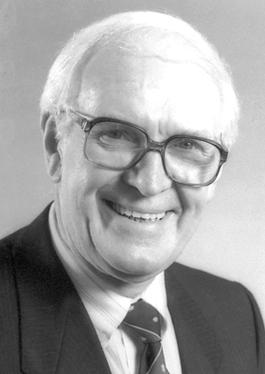
James Black (pharmacologist)
Sir James Whyte Black OM FRS FRSE FRCP (14 June 1924 – 22 March 2010[2]) was a Scottish physician and pharmacologist. Together with Gertrude B. Elion and George H. Hitchings, he shared the Nobel Prize for Medicine in 1988 for pioneering strategies for rational drug-design, which, in his case, lead to the development of propranolol and cimetidine.[3][4] Black established a Veterinary Physiology department at the University of Glasgow, where he became interested in the effects of adrenaline on the human heart. He went to work for ICI Pharmaceuticals in 1958 and, while there, developed propranolol, a beta blocker used for the treatment of heart disease.[5] Black was also responsible for the development of cimetidine, an H2 receptor antagonist, a drug used to treat stomach ulcers.
Sir James Black
22 March 2010 (aged 85)
United Kingdom
work towards the use of propranolol and cimetidine
- Lasker Award (1976)
- FRS (1976)[1]
- Mullard Award (1978)
- Artois-Baillet Latour Health Prize (1979)
- Cameron Prize for Therapeutics of the University of Edinburgh (1980)
- Nobel Prize for Medicine (1988)
- Royal Medal (2004)
Early life and education[edit]
Black was born on 14 June 1924 in Uddingston, Lanarkshire, the fourth of five sons of a Baptist family which traced its origins to Balquhidder, Perthshire.[6] His father was a mining engineer.[6] He was brought up in Fife, educated at Beath High School, Cowdenbeath, and, at the age of 15, won a scholarship to the University of St Andrews.[6] His family had been too poor to send him to university and he had been persuaded to sit the St Andrews entrance exam by his maths teacher at Beath.[7]
Until 1967, University College, Dundee was the site for all clinical medical activity for the University of St Andrews. He matriculated at University College (which eventually became the University of Dundee) in 1943 and graduated from University of St Andrews School of Medicine with an MB ChB in 1946.[8] During his time at St Andrews, Black lived in St Salvator's Hall.
After graduating, he stayed at University College to join the physiology department as an assistant lecturer before taking a lecturer position at King Edward VII College of Medicine in Singapore that subsequently became part of the University of Malaya.[8][9] Black had decided against a career as a medical practitioner as he objected to what he considered the insensitive treatment of patients at the time.[9]
Personal life[edit]
Black met Hilary Joan Vaughan (1924–1986) at a university ball in 1944 and the couple married in 1946 upon his graduation. He described her as the "mainspring" of his life until she died aged 61 in Surrey.[6][24] The couple had a daughter, Stephanie, born in 1951.[6] Black remarried in 1994, to Professor Rona MacKie.[9] Black was a very private man who was averse to publicity and was horrified to discover he had won the Nobel Prize.[9]
Black died, aged 85, on the morning of 22 March 2010 after a long illness. His death was announced by the University of Dundee, where Black served as Chancellor from 1992 to 2006.[25] His funeral was held on 29 March at St. Columba's Church, London.[10] He is buried at the Ardclach cemetery, a parish established in 1655, near Nairn, Scotland. Upon hearing of Black's death, Professor Pete Downes, Principal and Vice-Chancellor of the University of Dundee said Black "was a great scientist, but he was also a great man to know" while the BBC said he was "hailed as one of the great Scottish scientists of the 20th Century".[19] He was described by The Daily Telegraph as the man who earned the most for the pharmaceutical industry through his drug development, though he received little personal financial gain from his work.[9]
Shortly after his death the Bute Medical School of the University of St Andrews, where Black had studied for his initial degree in medicine, announced that an honorary 'Sir James Black Chair of Medicine' would be created.[26] In September 2010 the first Chair of Medicine at the University was given to Professor Stephen H Gillespie MD, DSc, FRCP (Edin), FRC Path, who left his post as Professor of Medical Microbiology at UCL.